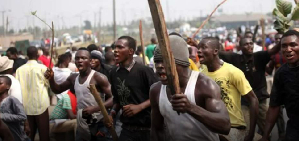The Monitoring and Evaluation Specialist for Northern Region Social Cohesion (SOCO) project, George Owusu, has said that many ethnic groups in the Northern part of the country have experienced unity as a result of the Gulf of Guinea Northern Regions Social Cohesion (SOCO) project.
The northern parts of Ghana have known a number of inter-ethnic conflicts but according to George Owusu, peace has prevailed between various communities and groups through an initiative called "SOCO Games".
George Owusu revealed in an interview on UTV's Mpu Ne Mpu program that football gala competitions are held among the communities, with prizes and trophies awarded to the top-performing community.
In addition to football games, he continued, SOCO Games hosts cultural exhibitions between the various ethnic groups, which promote unity and harmony among them.
"With our SOCO Games program, we unite the communities. We invite the communities to compete with one another, and the one that comes out on top gets awarded with a trophy and prizes," he revealed.
"Also, we have inter-cultural meetings and groups, so through cultural identities and displays, we can bring Dagomba and Wala people together to perform cultural displays which ends up bringing peace and unity between them," he stated.
According to George Owusu, in its first year of operation, the SOCO Project, which aims to make communities resilient to vulnerabilities and economically empowered, has completed 530 infrastructure projects.
He said that the SOCO project has significantly improved the five northern regions and the Oti area, from building roads and classrooms to granting access to clean water and healthcare.
George Owusu listed 42 roads, 66 teacher housing and classroom blocks, 74 rural markets, 55 health facilities, and 211 water facilities—including small-town water systems, mechanized boreholes, and boreholes with manual pumps—as some of the completed projects.
He said that these programs have directly impacted the lives of over 260,000 people, and will continue to impact many more in the years ahead.
Regional News of Tuesday, 8 October 2024
Source: ghanaguardian.com

















